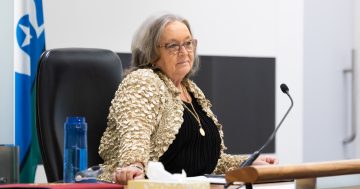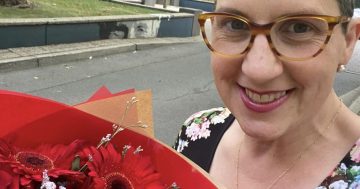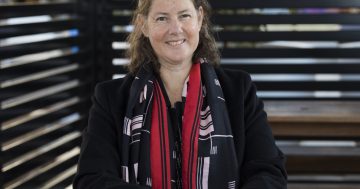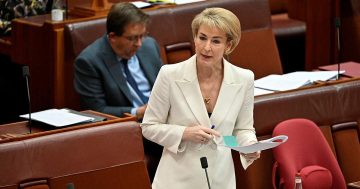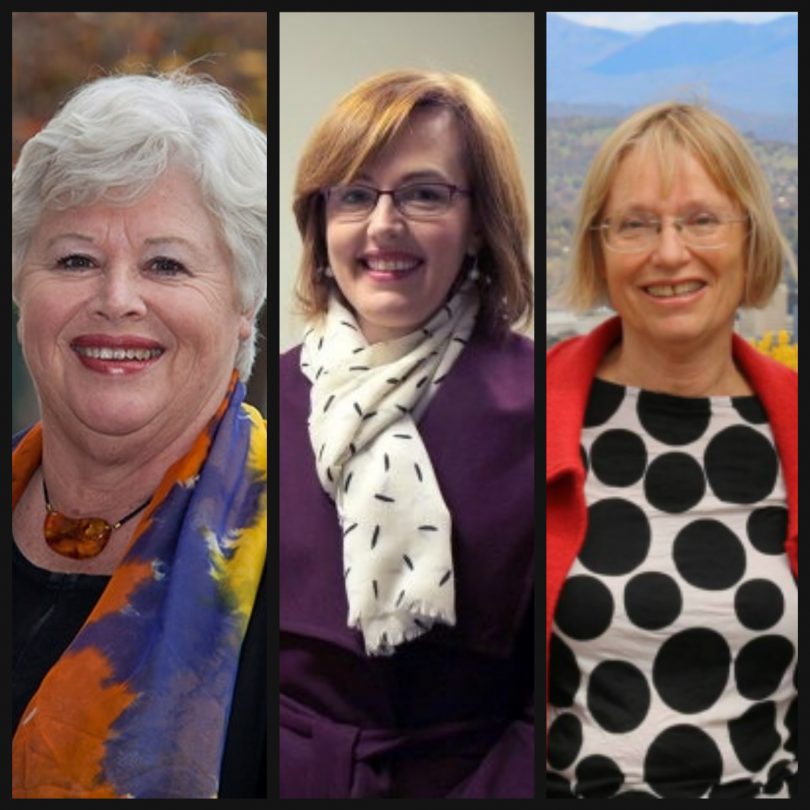
Three women, three different parties, one goal: to serve Canberra. File photos.
On 26th June 2019, Minister for Transport and Health Meegan Fitzharris announced her resignation from the Legislative Assembly. In a statement, she said her decision to step down from politics was a personal one.
On 24th July, veteran Liberal politician Vicki Dunne declared she will not contest the next election. Greens MLA Caroline Le Couteur followed suit on 5 August.
That’s three female politicians in three months. And while they come from different political backgrounds, they share one thing in common: all agree the ACT is the best place in Australia for a woman in politics.
Ms Dunne was the ACT Liberal Party Division’s General Secretary and a mother of a five-month-old. Ms Fitzharris put her hand up for pre-selection for the Labor party fresh out of maternity leave. Both had personal and professional support. Ms Dunne’s fifth child even did a brief stint in politics as a baby, crawling around Gary Humphries’s office while his mother worked.
A passion for their community and a commitment to making the world a better place attracted them to their profession.
“I’ve been an activist for all my adult life,” Ms Le Couteur said. “Electoral politics was an extension of that.”
While Ms Dunne’s politically active family was foundational for her involvement in politics, for Ms Fitzharris, politics was the obvious choice from a range of options, when the stars aligned in 2012 for preselection.
“Politics is a profession and a vocation,” she opines. “But it is also quite demanding and time-consuming.”
“It is really hard work and takes time,” Ms Le Couteur agreed. “A lot of work that goes into just getting elected.”
Having two mammoth portfolios of Transport and Health at a time when Light Rail was breaking ground and the ACT’s health system was riddled with its own diseases, Ms Fitzharris knows too well about the demands of the job. But she’s quick to suggest that many careers are demanding, not just politics.
“Being a Minister was a large workload, but like any role, something’s got to give,” she said.
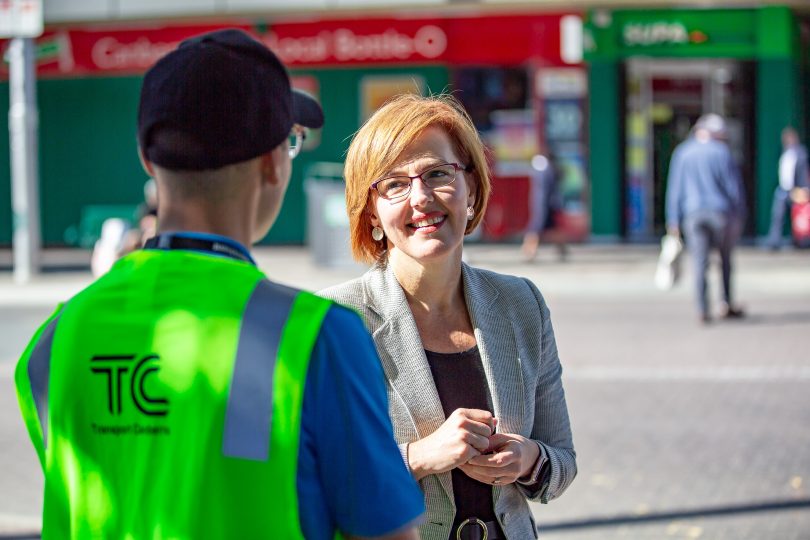
Ms Fitzharris served as the ACT’s Transport Minister and oversaw the opening of Light Rail Stage One.
And that’s where the Capital Territory stands out. There are no late-night sittings, Ms Le Couteur points out, so members of the Assembly return home to their families at a decent hour.
The proximity of the Legislative Assembly was also a major drawcard for the politicians. “I couldn’t do my job if I lived in any other place,” Ms Dunne said.
Refreshingly, all three women say the Legislative Assembly discourages discriminatory practices, and sexism hardly featured. Ms Dunne said she can count on the one hand the number of times someone threw a gendered comment her way, an impressive tally for a woman who’s been in politics since the 1980s.
This isn’t to say that the job is always pleasant, especially inside the Assembly. “The nastiness could be a barrier,’ Ms Le Couteur said. “Politics is aggro, and Question Time could have rude and disrespectful remarks which many may find offensive.”
But how much of that is real?
Ms Dunne sees the dog-eat-dog perception of politics as mainly theatrical. She says the job requires a thick skin, but knowing that healthy politics could be practised outside Question Time makes it more palatable.
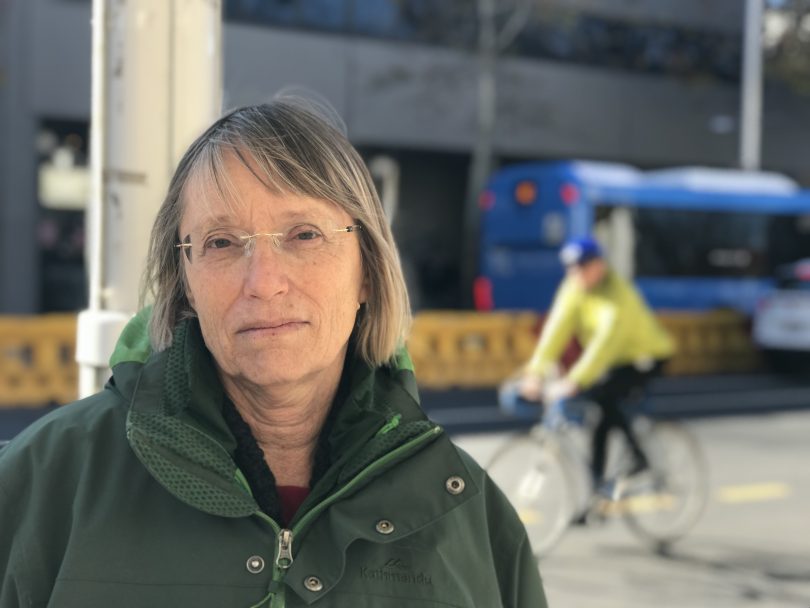
Caroline Le Couteur says she has been politically active throughout her adult life.
Women make up more than fifty per cent of representatives in the Legislative Assembly, but I asked about mandatory quotas at a national level.
Ms Le Couteur thought the concept was interesting, but would require major changes. She also reflected on the importance of considering minority communities, suggesting we could look to New Zealand for guidance if quotas were introduced.
A beneficiary of affirmative action, Ms Fitzharris sees proven benefits from a quota system to ensure diversity, while Ms Dunne said election should be based on merit, not difficult to prove in a country like Australia.
Finally, I asked the seasoned politicians what message they’d give young girls and aspiring fearless leaders.
“Get involved in issues that really rock your boat,” Ms Le Couteur advised. “Lots of NGOs influence politics; start there if you want to make a change. Then talk to your family, seek support, and put your hand up.”
“There’s a momentum for women in politics and the ACT is a standout”, Ms Fitzharris said. “Reach out to existing networks to find out more and get a variety of experiences. Talk to people in the opposition.
“Politics is not something you have to do for the rest of your life. You can always be engaged in politics without having to be in the Assembly. You can still make a difference within a certain period of time.
“Modern careers are about a range of experiences and a political career can be one of them.”
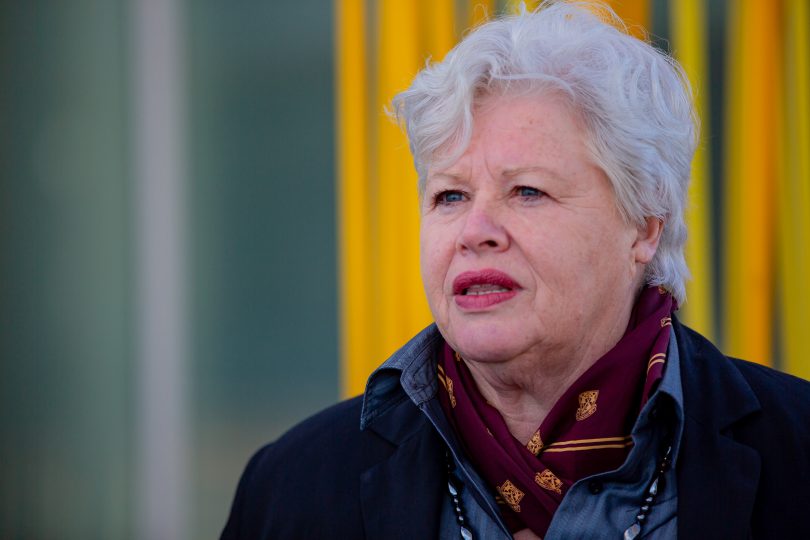
Ms Dunne’s advice to young female politicians: start at the grassroots and don’t rush it.
“Be patient; don’t do everything at once,” Ms Dunne advised. “You don’t have to do everything by the time you’re 30.
“Politics isn’t just about being elected. Start at the grassroots, know your electorate, then build relationships. Build your skills in retail politics.”
While the state of our national affairs leaves much to be desired for female politicians, the thought of a small but effective Legislative Assembly at the heart of the Capital leading the way in promoting an environment for women to take the lead is enough to make any Canberran proud.












